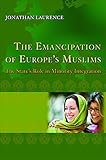The Emancipation of Europe's Muslims : The State's Role in Minority Integration.
Material type: TextSeries: Princeton Studies in Muslim Politics SerPublisher: Princeton : Princeton University Press, 2011Copyright date: ©2012Description: 1 online resource (346 pages)Content type: text Media type: computer Carrier type: online resourceISBN: 9781400840373Subject(s): Social integration -- Religious aspects -- IslamGenre/Form: Electronic books.Additional physical formats: Print version:: The Emancipation of Europe's Muslims : The State's Role in Minority IntegrationDDC classification: 305.697094 LOC classification: HM683 -- .L38 2012ebOnline resources: Click to View
TextSeries: Princeton Studies in Muslim Politics SerPublisher: Princeton : Princeton University Press, 2011Copyright date: ©2012Description: 1 online resource (346 pages)Content type: text Media type: computer Carrier type: online resourceISBN: 9781400840373Subject(s): Social integration -- Religious aspects -- IslamGenre/Form: Electronic books.Additional physical formats: Print version:: The Emancipation of Europe's Muslims : The State's Role in Minority IntegrationDDC classification: 305.697094 LOC classification: HM683 -- .L38 2012ebOnline resources: Click to View Cover Page -- Title Page -- Copyright Page -- Dedication Page -- Contents -- List of Illustrations -- List of Tables -- List of Abbreviations -- Preface -- Chapter One: A Leap in the Dark: Muslims and the State in Twenty-first-Century Europe -- Chapter Two: European Outsourcing and Embassy Islam: L'islam, c'est moi -- Chapter Three: A Politicized Minority: The Qur'ân is our Constitution -- Chapter Four: Citizens, Groups, and the State -- Chapter Five: The Domestication of State-Mosque Relations -- Chapter Six: Imperfect Institutionalization: Islam Councils in Europe -- Chapter Seven: The Partial Emancipation: Muslim Responses to the State-Islam Consultations -- Chapter Eight: Muslim Integration and European Islam in the Next Generation -- Notes -- Interviews -- Bibliography -- Index.
The Emancipation of Europe's Muslims traces how governments across Western Europe have responded to the growing presence of Muslim immigrants in their countries over the past fifty years. Drawing on hundreds of in-depth interviews with government officials and religious leaders in France, Germany, Italy, the Netherlands, the United Kingdom, Morocco, and Turkey, Jonathan Laurence challenges the widespread notion that Europe's Muslim minorities represent a threat to liberal democracy. He documents how European governments in the 1970s and 1980s excluded Islam from domestic institutions, instead inviting foreign powers like Saudi Arabia, Algeria, and Turkey to oversee the practice of Islam among immigrants in European host societies. But since the 1990s, amid rising integration problems and fears about terrorism, governments have aggressively stepped up efforts to reach out to their Muslim communities and incorporate them into the institutional, political, and cultural fabrics of European democracy. The Emancipation of Europe's Muslims places these efforts--particularly the government-led creation of Islamic councils--within a broader theoretical context and gleans insights from government interactions with groups such as trade unions and Jewish communities at previous critical junctures in European state-building. By examining how state-mosque relations in Europe are linked to the ongoing struggle for religious and political authority in the Muslim-majority world, Laurence sheds light on the geopolitical implications of a religious minority's transition from outsiders to citizens. This book offers a much-needed reassessment that foresees the continuing integration of Muslims into European civil society and politics in the coming decades.
Description based on publisher supplied metadata and other sources.
Electronic reproduction. Ann Arbor, Michigan : ProQuest Ebook Central, 2018. Available via World Wide Web. Access may be limited to ProQuest Ebook Central affiliated libraries.

There are no comments on this title.